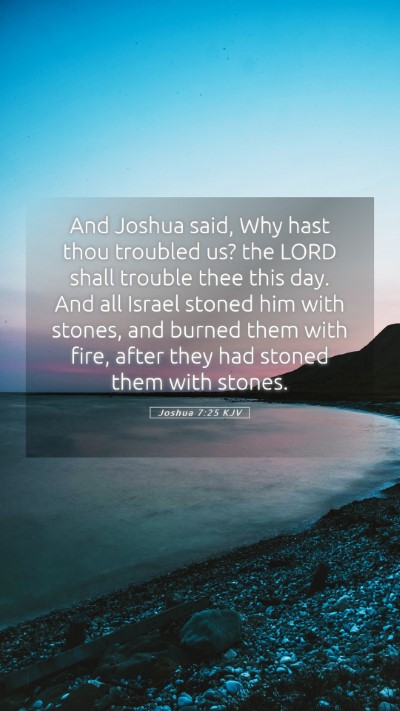Understanding Joshua 7:25
Verse: “And Joshua said, Why hast thou troubled us? the LORD shall trouble thee this day. And all Israel stoned him with stones, and burned them with fire, after they had stoned them with stones.” (Joshua 7:25, KJV)
Overview: This verse expresses the consequences of sin in the community of Israel, highlighting the severity with which God deals with disobedience. Achan's sin brought trouble to the entire nation, and this incident serves as a warning regarding collective accountability within the body of believers.
Bible Verse Meanings and Interpretations
This passage is significant for understanding divine justice and communal harmony in biblical contexts. It illustrates how individual actions can provoke divine wrath that affects others. Below, we explore insights from various public domain commentaries to deepen our Bible verse understanding.
Matthew Henry's Commentary
- Accountability: Henry notes that Achan's sin directly caused trouble for the Israelites. His actions led to defeat in battle, proving that personal sin can have corporate effects.
- God’s Judgment: The swift execution of judgment against Achan emphasizes God's holiness and the seriousness with which He views sin among His people.
- Divine Retribution: The consequences of Achan's actions serve as a reminder that God responds to sin with justice, ensuring that the guilty are punished.
Albert Barnes' Commentary
- The Impact of Sin: Barnes explains that Achan’s sin led to Israel's defeat at Ai, as the Lord had commanded them not to take certain spoils. This illustrates how one person's transgression can lead to collective failure.
- Justice in the Community: The stoning of Achan signifies not only his punishment but also the importance of maintaining purity within the camp of Israel. It reflects the principle of removing evil to preserve the whole.
- Divine Consistency: Barnes emphasizes that God's dealings with sin are consistent and firm. His justice may be harsh, but it is important for maintaining order and righteousness among His people.
Adam Clarke's Commentary
- Symbolic Punishment: Clarke delves into the symbolism of being stoned and burned, representing a complete severance from the community and a warning against sin.
- Lessons on Obedience: The narrative underscores the necessity for obedience to God's commands, reinforcing that neglecting His instructions invites severe repercussions.
- Covenantal Aspect: Clarke makes note that the Israelites were in a covenant with God, and violations of this covenant were taken seriously, culminating in Achan's execution as a means of restoring order.
Bible Study Insights
When studying this verse, one should consider its implications for personal and communal righteousness. Understanding this passage necessitates a deep dive into themes of sin, judgment, accountability, and the importance of obedience. The interpretation of Joshua 7:25 serves as a cautionary tale about the repercussions of sin within a community.
Applications of the Verse
- Collective Responsibility: Individuals must recognize their roles within a community and consider how their choices affect those around them.
- Awareness of Sin: This verse serves as a reminder to examine one’s life for any hidden sin that could lead to trouble not just personally but also collectively.
- Importance of Obedience: The passage underscores the significance of following God's commands closely, reflecting our commitment to His standards and directives.
Related Bible Cross References
- Joshua 1:18 - Refers to the importance of obedience in the face of God's commands.
- Ecclesiastes 9:18 - Discusses the implications of wisdom and foolishness in the context of society.
- Romans 6:23 - Speaks on the wages of sin being death, which parallels the consequences shown in Joshua.
- Galatians 6:7-8 - Illustrates the principle of sowing and reaping, relevant to the idea of accountability in actions.
Conclusion
In conclusion, Joshua 7:25 encapsulates significant doctrinal truths regarding the consequences of sin, the nature of God's judgment, and the concept of communal responsibility. An in-depth understanding of this verse enhances our bible study insights, aiding us in applying these lessons to our lives today. It serves both as a caution against sin and a call to accountability, underscoring the importance of living a life that honors God’s commands.


